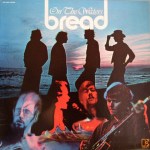This commentary was written years ago in an effort to promote the mostly forgotten and certainly overlooked qualities of Bread’s superb recordings.
We are rarely able to do shootouts for their albums these days, due to a lack of interest on our customers’ parts, given our prices. More’s the pity.
Instead, we recommend you pick up some early pressings of Bread’s albums at your local record store and see if the wondeful analog sound Armin Steiner achieved in the studio makes you a fan of the band the way it did me. More on Armin Steiner and Bread here.
In many ways On the Water is a Demo Disc recording.
Listening to the tubey magical acoustic guitars on the best copies brings back memories of my first encounter with an original Pink Label Tea for the Tillerman. Rich, sweet, full-bodied, effortlessly dynamic — that sound knocked me out thirty-odd years ago, and here, on an album by the largely-forgotten band Bread, is that sound again.
Looking back, 1970 turned out to be a great year for rock and pop, arguably the greatest.
I’ve always been a sucker for this kind of well-crafted pop. If you are too, then a Hot Stamper copy of Manna will no doubt become a treasured demo disc in your home as well.
Audiophiles with high quality turntables literally have an endless supply of good recordings such as this to discover and enjoy. No matter how many records you own, you can’t possibly have even scratched the surface of the vast recorded legacy of the last sixty years.
That’s the positive thought for the day.
We here at Better Records look forward to helping you find recordings that do justice to the music you have yet to hear.
This link will take you to more reviews of our favorite Tubey Magical Demo Discs
The complete list of Demonstration Quality Discs we’ve compiled to date can be found here.
Side One
Let Your Love Go
Take Comfort
Too Much Love
If
Be Kind to Me
He’s a Good Lad
Side Two
She Was My Lady
Live in Your Love
What a Change
I Say Again
Come Again
Truckin’
Audio Issues
It’s clear to us that our stereo system loves this record. Let’s talk about why we think that might be.
Our system is fast, accurate and uncolored. We like to think of our speakers as the audiophile equivalent of studio monitors, showing us to the best of their ability exactly what is on the record, no more and no less.
When we play a modern record, it should sound modern. When we play a vintage Tubey Magical Living Stereo pressing such as this, we want to hear all the Tubey Magic, but we don’t want to hear more Tubey Magic than what is actually on the record. We don’t want to do what some audiophiles like to do, which is to make all their records sound the way they like all their records to sound.
They do that by having their system add in all their favorite colorations. We call that “My-Fi,” not “Hi-Fi,” and we’re having none of it.
If our system were more colored, or slower, or tubier, this record would not sound as good as it does. It’s already got plenty of richness, warmth, sweetness and Tubey Magic.
To take an obvious example, playing the average dry and grainy Joe Walsh record on our system is a fairly unpleasant experience. Some added warmth and richness, with maybe some upper-midrange suckout thrown in for good measure, would make it much more enjoyable. But then how would we know which Joe Walsh pressings aren’t too dry and grainy for our customers to enjoy? We discussed some of these specific issues in another commentary:
We’ve put literally thousands of hours into our system and room in order to extract the maximum amount of information, musical and otherwise, from the records we play, or as close to the maximum as we can manage. Ours is as big and open as any system in an 18 by 20 by 8 room I’ve ever heard.
It’s also as free from colorations of any kind as we can possibly make it. We want to hear the record in its naked form; not the way we want it to sound, but the way it actually does sound. That way, when you get it home and play it yourself, it should sound very much like we described it.
If too much of the sound we hear is what our stereo is doing, not what the record is doing, how can we know what it will sound like on your system? We try to be as truthful and as critical as we can when describing the records we sell. Too much coloration in the system makes those tasks much more difficult, if not a practical impossibility.
We are convinced that the more time and energy you’ve put into your stereo over the years, decades even, the more likely it is that you will hear this wonderful record sound the way we heard it. And that will make it one helluva Demo Disc in your home too.
Further Reading
 More of the Music of Cat Stevens
More of the Music of Cat Stevens